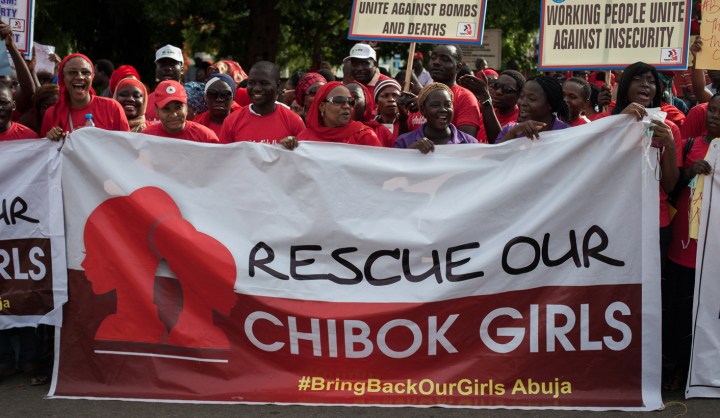Africa
Analysis: The Chibok kidnapping – an intricate public relations exercise

Boko Haram has confirmed that it is responsible for the kidnapping of 300 Nigerian women. But if human trafficking were truly the motivation behind Boko Haram’s abduction of the Chibok students, why would leader Abubakar Shekau wait nearly three weeks to claim responsibility for the incident? By RYAN CUMMINGS.
In a video released to AFP on 5 May, Boko Haram leader, Abubakar Shekau, confirmed what many had feared – that the Islamist extremist sect was responsible for the 15 April kidnapping of more than 300 female students from the north-eastern Nigerian town of Chibok.
In the communique, Shekau stated, “I am the one who captured all those girls and will sell all of them. I have a market where I sell human beings because it is Allah that says I should sell human beings. Yes, I will sell women, because I sell women.”
Shekau’s rhetoric seemingly confirmed my initial suggestions that human trafficking may have been a motivation for the Chibok kidnapping. In my blog entry ‘Why have you taken our girls?’ I referenced an extract from a 30 March statement which Shekau had made, threatening the abduction and possible trade of female civilians. “In Islam, it is allowed to take infidel women as slaves and, in due course, we will start taking women away and sell [them] in the market,” Shekau had declared.
But if human trafficking were truly the motivation behind Boko Haram’s abduction of the Chibok students, why would Shekau wait nearly three weeks to claim responsibility for the incident? More importantly, why would Boko Haram make explicit its intentions and possibly risk compromising what would otherwise be a lucrative revenue-generating enterprise? I believe the answer lies in the fact that Boko Haram never intended to sell its hostages, at least not in the manner in which Shekau’s rhetoric suggested.
Considering the circumstances which surrounded their abduction and which would surround Boko Haram’s claims of responsibility, the kidnapping of the Chibok girls has been orchestrated as an intricate and well-planned public relations exercise aimed at captivating both a local and international audience. In kidnapping 300 girls mere hours after killing more than 70 people in the Nigerian capital, Boko Haram has nullified any suggestions that it has suffered an operational decline and/or that the government has gained any foothold in its ongoing war against the insurgency. (Narratives which the Nigerian government had often forwarded when questioned about the progression of its counterinsurgency campaign.)
Furthermore, the timing of Shekau’s most recent communique was also likely a deliberate and considered decision aimed at garnering international attention. It is no coincidence that Boko Haram confirmed its responsibility for the abductions at a time when a social media campaign, using the twitter hashtag #bringbackourgirls, had peaked and where associated protest gatherings occurred with a degree of spontaneity in major cities across the world.
However, apart from glorifying its capabilities and highlighting the deficiencies of the Nigerian government, Boko Haram’s need for publicity may also be the most important indicator of the fate of the Chibok hostages. As mentioned, while trafficking was always considered a plausible outcome for the detainees, the group’s actions to date seem incongruent with such an undertaking. Instead, it seems more plausible that Boko Haram already are or likely will use the hostages to negotiate some form of concessions from the Nigerian government. This could either see the Chibok girls being exchanged for Boko Haram detainees and/or to extort a ransom payment or other material assets. Any such outcome will not only seek to strengthen the operational capacity of the sect, but do so to the detriment of the Nigerian government. By drawing as much attention to the incident as it has, Boko Haram has placed itself in an extremely strong bargaining position and is pressuring the Goodluck Jonathan regime to act with a decisiveness and rapidity which has been sorely lacking in its response to the insurgency.
Although Jonathan has denounced that he would enter into ransom negotiations with Boko Haram, his government does not have much of a choice in the matter. A military option aimed at rescuing the hostages is simply not feasible, as any such initiative will undoubtedly significantly risk the well-being of the hostages. Any actions by the Nigerian government which result in harm to any of the hostages would likely be considered the greatest indictment against Jonathan’s already blemished tenure. However, not responding to the situation with the conviction that the Nigerian and international communities are demanding will be equally damaging. Growing claims that Jonathan is losing his grip on the Boko Haram insurgency will only become more audible, should his government fail to secure the immediate release of the Chibok girls. Although Jonathan may consider bargaining with Boko Haram as a sign of weakness, and possibility counter-intuitive to Nigeria’s ongoing fight against them, he should perhaps be reminded that when one is standing on the edge of a cliff, taking a step backwards may is often the only means of progress. DM
Photo: Protesters take part in a march in the Nigerian capital Abuja over the government’s failure to rescue scores of schoolgirls kidnapped by Boko Haram Islamists, in Abuja, Nigeria, 06 May 2014. EPA/RUTH MCDOWALL



















 Become an Insider
Become an Insider